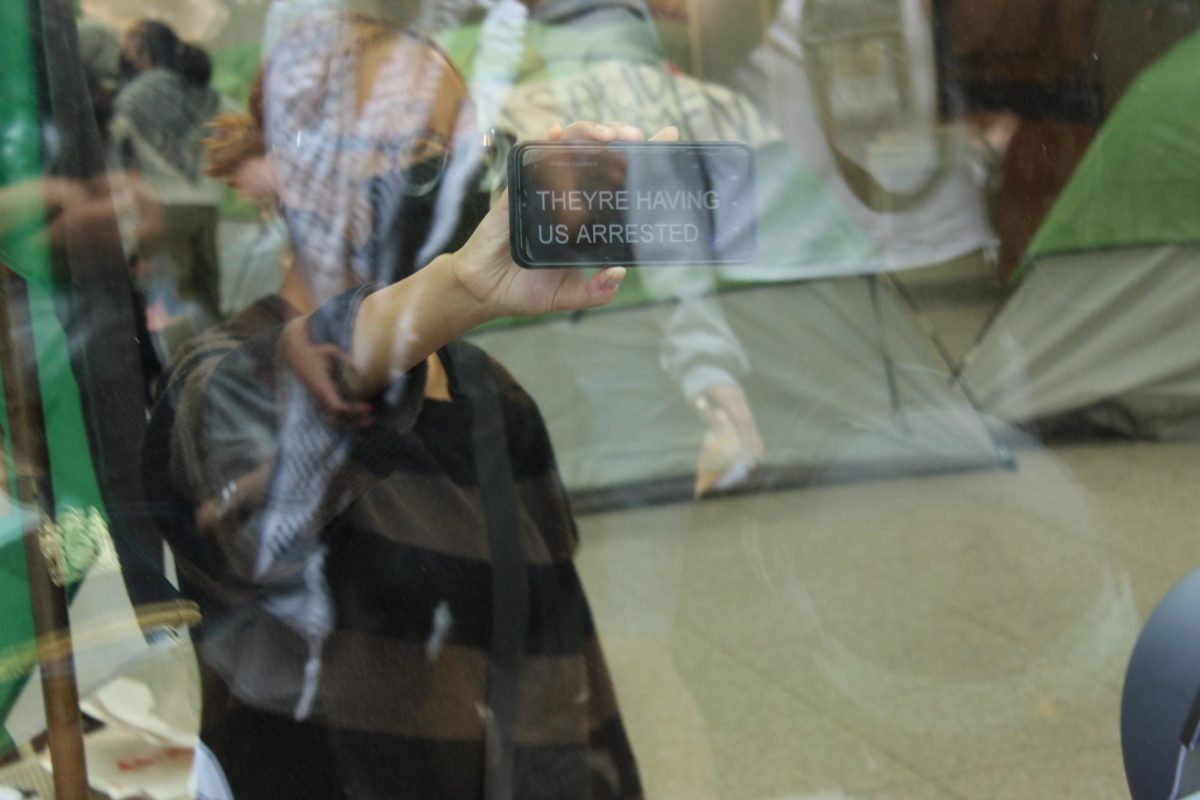Free speech shaped higher education in the United States, but the increasingly polarized political culture has caused campuses to reevaluate how the First Amendment applies to the classroom. It’s no surprise that student protesters are being targeted by campus administration, law enforcement and politicians in an ongoing national debate about democracy and education.
Protests have arisen across the United States issuing demands that the U.S. government pull its support of Israel’s genocidal tactics on Palestinian civilians by withholding assets and funding to Israeli forces. With the extension of the conflict into spring 2024, university students have organized campus protests demanding that their institutions divest resources from Israel and cut any antisemitic and Islamophobic affiliations.
University administrators have responded by calling in law enforcement to remove student protesters and journalists, the majority of which have been peaceful.
If the First Amendment can protect terrorist groups, then surely it should protect peaceful student protesters.
At Columbia University, for example, busloads of students were arrested on April 31 after being forced out by the New York Police Department (NYPD) equipped with riot gear and stun grenades. On the University of California, Los Angeles’s campus, the Los Angeles Police Department stood by while violent counter-protesters attacked the pro-Palestinian encampment on May 1. Later that day, the Fordham University administration called in the NYPD to arrest student protesters who organized an encampment in the lobby of the Leon Lowenstein Center.
What’s at stake when university administrators turn against their students? Beyond the cause for which the students advocate, the students also represent a constitutionally affirmed and inherent right to free speech. By threatening violence, administrators are denying students their First Amendment rights.
The First Amendment has been used in the past to affirm the rights of neo-Nazis and the KKK. The American Civil Liberties Union notes, “we believe that the constitutional guarantees of freedom of speech and press would be meaningless if the government could pick and choose the persons to whom they apply.” If the First Amendment can protect terrorist groups, then surely it should protect peaceful student protesters.
Ignoring the significance of past student-led protests dooms lawmakers and college administrators to repeat their mistakes.
Unfortunately, the current legislative climate is not on the student activists’ side. In March 2024, The Supreme Court refused to hear Mckesson v. Doe, which resulted in three states banning mass protests. On November 16, 2023, The University of Florida chapter of Students for Justice in Palestine (SJP) filed a lawsuit against its college administrators that can further define how the First Amendment will be interpreted on college campuses and in terms of mass protests.
Campus protests were integral to historical socio-political movements such as the Civil Rights and Feminist movements, ending American involvement in the Vietnam War, and ending South African Apartheid. The students of these past movements also set legal precedents that should protect the First Amendment rights of student activists and journalists today.
Ignoring the significance of past student-led protests dooms lawmakers and college administrators to repeat their mistakes. Student protests against the American involvement in the Vietnam War were ignored for nearly a decade, at which point many activists turned to riot tactics to get their message across. Peaceful protests turning aggressive should not be used as a justification for silencing protesters; rather, it should encourage people in power to listen to protesters’ voices without creating a need for escalation.
College administrators and policymakers understand that they can discredit protests by painting them as violent because of past movements. By depicting peaceful protests as hazardous, they also depict free speech as threatening instead of productive. To stake this claim in a college setting is extremely dangerous to the way the First Amendment is applied in an academic context. It promises to restrict the rights of future students and Americans.
On May 2, President Joe Biden addressed the subject of nationwide campus protests, many of which are calling for a ceasefire in Gaza and for their universities to divest from companies supporting Israel. Biden said that protests have not forced him to reconsider his policies concerning the Middle East, according to Reuters. This comment represents how swiftly the protests and encampments have been silenced, and thus, students’ demands have been ignored.
On the evening of May 1, University President Tania Tetlow responded to the pro-Palestine encampment and subsequent protest at Fordham Lincoln Center, claiming that the protesters in the lobby of the Leon Lowenstein Center were unidentified and posed a threat to campus security, despite the fact that the The Observer later confirmed that the 15 protesters who were arrested were made up of 11 students and four alumni.
Tetlow’s email also promised to negotiate with SJP, but the student-led activism group says it made no progress with administration despite outlining their demands in a publicly available statement.
By denying both activism and journalism, administrators have made their intentions clear. Their goal is to silence, not facilitate, discourse; there is no free speech when one source of authority controls the narrative.
Not only have the protesters been punished by administration, student journalists are also struggling to safely document the protests on their campuses. On May 1, The College Media Association and other journalism organizations issued an open letter calling for college administrators to protect the rights of college journalists and their faculty advisors in light of the harassment and restriction that students face as “recorders of history.”
“We call on (administrators) to not just respect (student’s) rights as journalists, but to also wholeheartedly support them in their responsibility. They are the future of this industry and their country,” the letter reads. “Let them do their work in recording the present.”
By denying both activism and journalism, administrators have made their intentions clear. Their goal is to silence, not facilitate, discourse; there is no free speech when one source of authority controls the narrative.
In the United States and on college campuses, there are still a considerable number of privileges allotted to protesters and student journalists in terms of free speech. In Arab countries, there have been fewer protesters and on a smaller scale as sympathizers fear that protesting could go against their countries’ policies on political expression. In a global context, American students still have significant privileges to organize and engage in public discourse.
The concern, then, is not so much that Americans lack First Amendment rights at this moment. Rather, the rising concern is whether students will still have the option to organize, speak and report on meaningful issues without suffering severe consequences in the near future.
How administrators and politicians respond to student-led activism sets the tone for future policy. Right now, they’re choosing to depict peaceful expression as violent and intolerable. They blame protesters rather than administrative decisions and law enforcement when education is disrupted. They interfere with student journalists’ ability to report on campus events effectively and safely. College administrators — including Fordham’s — define how powerful people like President Biden can interpret and restrict American rights to free speech.
Administrators must understand the historical necessity of student-led political movements and First Amendment rights in an academic setting, and they must seriously consider the consequences of a continued tirade against reliable journalism, social progress and student activism. To defend student protesters is to defend First Amendment rights.



Killer Marmot • Aug 16, 2024 at 5:40 pm
Encampments, building occupations, and disruptions are not free speech. Students have the right to peacefully demonstrate. They do not have the right to intefere with the normal running of the university.